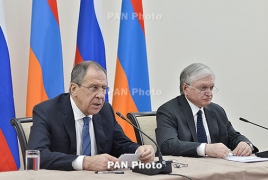           Armenia didn’t reject Kazan document on Karabakh: Lavrov PanARMENIAN.Net - Maintaining the 1994-1995 ceasefire agreement in Karabakh is a key priority, Russian Foreign Minister Sergey Lavrov told a joint press conference with his Armenian counterpart Edward Nalbandian on Friday, April 22 in Yerevan. "Russia, both as a country and a Co-chair of the OSCE Minsk Group will do everything to support the parties in observing the ceasefire agreement,” Lavrov said. "Also of great importance is the practical realization of trust-building measures and those of investigating border incidents that were adopted in 2011.” Commenting on Turkey’s position on the escalation between Karabakh and Azerbaijan, Lavrov declared that Turkish leaders have been calling for war and not for peace, which totally contradicts the position of the Co-chairs and that of the international community. “But we are quite accustomed to such twists by Turkey,” he added. Asked about Russian media reports suggesting that both Armenia and Azerbaijan rejected the Kazan document, Lavrov said: “Armenia did not reject the Kazan document.” “As my colleague noted, Armenia made no rejections, but Azerbaijan did, as it had done before in Sochi, Moscow, Astrakhan, Saint Petersburg, and even 10 years ago in Paris,” Nalbandian noted. In July 2009, the three leaders of the OSCE Minsk Group co-chairing countries released a statement urging Presidents of Armenia and Azerbaijan to "resolve the few differences remaining between them and finalize their arrangement on these Basic Principles." According to the statement, the Basic Principles for the settlement of the Nagorno Karabakh conflict are based on the Helsinki Final Act (1975) principles of Non-Use of Force, Territorial Integrity, and the Equal Rights and Self-Determination of Peoples. The above-mentioned document, known as Madrid Principles, also revealed the six elements for the settlement: return of the territories surrounding Nagorno-Karabakh to Azerbaijani control; an interim status for Nagorno Karabakh providing guarantees for security and self-governance; a corridor linking Armenia to Nagorno Karabakh; future determination of the final legal status of Nagorno Karabakh through a legally binding expression of will; the right of all internally displaced persons and refugees to return to their former places of residence; and international security guarantees that would include a peacekeeping operation. Kazan document in fact includes the same Madrid principles with certain amendments Deputy Foreign Minister of Armenia Shavarsh Kocharyan said in mid-April. The Cabinet of Ministers decided on Thursday, November 9 to allocated AMD 120 million to arrange the gathering. Michael Roth believes sanctions must be put on the table after Baku‘s ethnic cleansing in Nagorno-Karabakh. The Yerevan City Council has elected Tigran Avniyan from the ruling Civil Contract as the mayor of the Armenian capital. The Armenian Parliament on Tuesday, October 3 voted to ratify the Rome Statute of the International Criminal Court. Partner news |